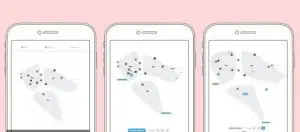
Emerging new institutions of conversation in the digital environment. A new form of online survey uses crowdsourcing and data visualization to reveal the hidden nuances in partisan debates.
Tiny, largely self-funded U.S. startup Pol.is has been working on their project for a while and already has some promising results. The company’s interactive, crowdsourced survey tool can be used to generate maps of public opinion that help citizens, governments, and legislators discover the nuances of agreement and disagreement on contentious issues that exist. In 2016, that information helped the government of Taiwan break a six-year deadlock over how to regulate online alcohol sales, caused by entrenched, opposing views among citizens on what rules should apply.
“It allowed different sides to gradually see that they share the same underlying concern despite superficial disagreements,” says Audrey Tang, Taiwan’s digital minister. The island’s government now routinely sends out Pol.is surveys using Facebook ads, and to special-interest groups. It has also used the system to help thrash out what rules should apply to Airbnb rentals and mobile ride-hailing services such as Uber.
Pol.is’s open-source software is designed to serve up interactive online surveys around a particular issue. People are shown a series of short statements about aspects of a broader issue—for example, “Uber drivers should need the same licenses cab drivers do”—and asked to click to signal that they agree or disagree. People can contribute new statements of their own for others to respond to. The tangle of crisscrossing responses is used to automatically generate charts that map out different clusters of opinion, making it easy to see the points on which people tend to overlap or disagree.
Colin Megill, cofounder and CEO of Pol.is, claims this approach gives governments and parties a better chance of understanding what people really care about than does soliciting avalanches of social media posts or e-mail comments. “This is a problem for lawmakers across the world right now,” he says. “We can help them understand what the electorate is feeling.”
You can visit Pol.is by clicking here
Leave a Reply